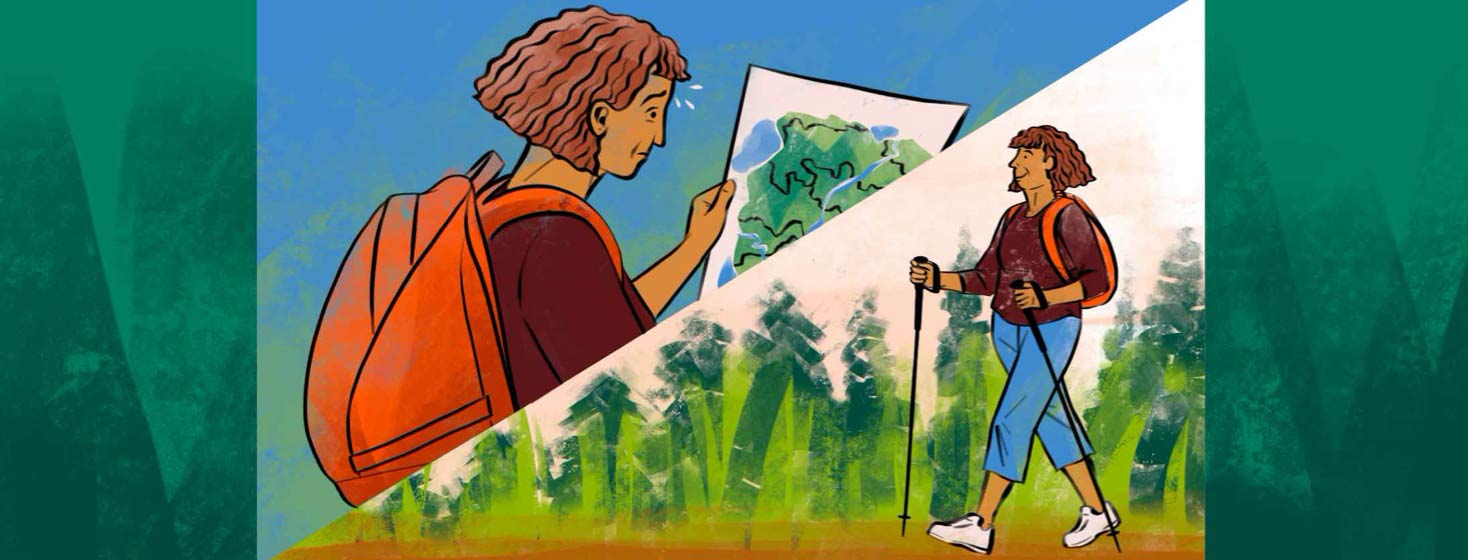Hiking Safely With CF
I married into a family that loves being outdoors--camping, mountain biking, running, hiking, you name it--they do it all. At first, this was totally intimidating because I didn’t grow up doing intense outdoor activities like this. As a family, we loved to be outside but at a slower pace.
Plus living with CF, I just don’t have the lung function to keep up with high intensity exercise like that on the spot. Now seven years into our marriage, I have figured out how I can be involved in what they love to do--hiking for example-- but do it in a safe and fun way with CF. Below are some of my tips for hiking safely.
Gather information
After many trial and error hikes, I know as someone with CF I need to gather more information about what type of hike we are attempting. For someone with normal lung function, it’s difficult to imagine how hard a simple hike can be for someone else with a different physical fitness. There’s been too many times where I sucked it up and attempted trails or distances that weren’t safe for someone with 60% or less lung function. It’s torturous!
Now, I know I need to ask vital questions like: How far? How long will we be hiking? What’s the altitude? How’s the incline? Where are we resting? Can we shorten it, if need be? Be prepared so you can enjoy hiking as well!
Know your hiking limits
After finding out more about the hike, I make a decision about my own limits and capabilities. Those capabilities are always changing depending on how stable my health is at the moment. I like challenges, but there’s a few hiking red flags I keep in mind always.
Hiking red flags:
- High heat and humidity
- High elevation
- Steep or inclined trails
- Very long distances
Hiking should be enjoyable and make you feel good after the fact; if you struggle to breathe the entire time, it can often feel like the opposite. CF will affect your ability to hike in instances like these and it’s ok to acknowledge that. I might choose to sit out on hikes where there’s extreme heat and humidity, higher elevation, steep inclines or very long distances.
Knowing my own physical limits and making judgement calls is important to keeping me safe and preserving the fun of hiking!
What to pack
I’m not someone who can grab a water bottle and set on my way to the trail. With CF, it takes a bit more planning and baggage in order to be safe while enjoying the scenery and exercise. These are typically the items I pack with me to go hiking:
1. Water or electrolyte drink
People with CF are at a higher risk of dehydration and heat stroke so staying hydrated is very important. Electrolyte drinks, like Liquid IV, are really helpful to replenish carbs, salt, and hydration.
2. Snack.... plus an extra
I always have a snack wherever I go. I usually pick something with enough carbs to raise my blood sugar during a low but also enough fat/protein to curb hunger like granola bars, fruit and cheese, etc. Then, I add an extra snack just in case.
3. Phone
My cell phone has an app that connects to my Continuous Glucose Monitor (CGM) and displays my blood sugar in real time. I always bring my phone for the reason and in case of emergencies.
4. Bronchodilator inhaler
In case of a respiratory emergency while hiking, I pack my fast-acting inhaler for times when I'm struggling to breathe. You don’t want to be stuck without a bronchodilator when being so active in remote places.
5. Glucometer
If you have CFRD, hiking in the middle of nowhere is not the appropriate time to guesstimate your blood sugar. Without a CGM, you really should pack a Glucometer to ensure you’re in range.
No matter the location or distance, hiking outside can be a fun and exciting form of exercise! With CF, there’s extra considerations to keep in mind in order to keep you safe.
Do you like to go hiking? Where are your favorite hiking locations? Share your tips for hiking safely with us below!

Join the conversation